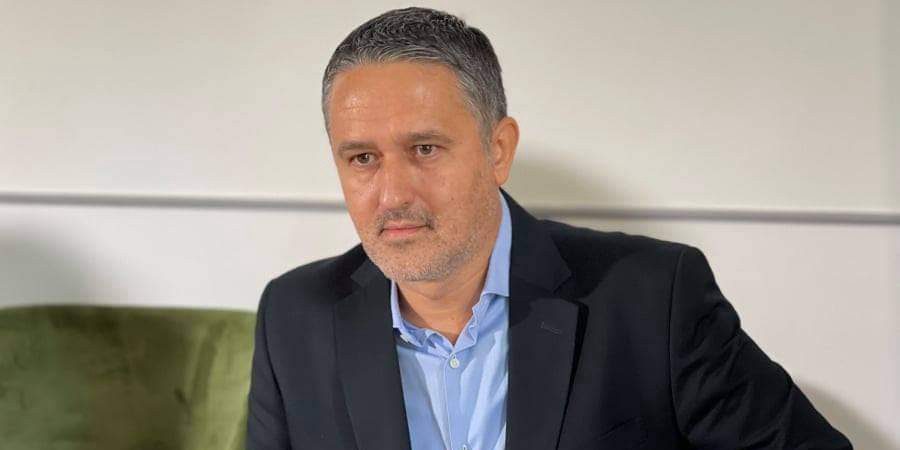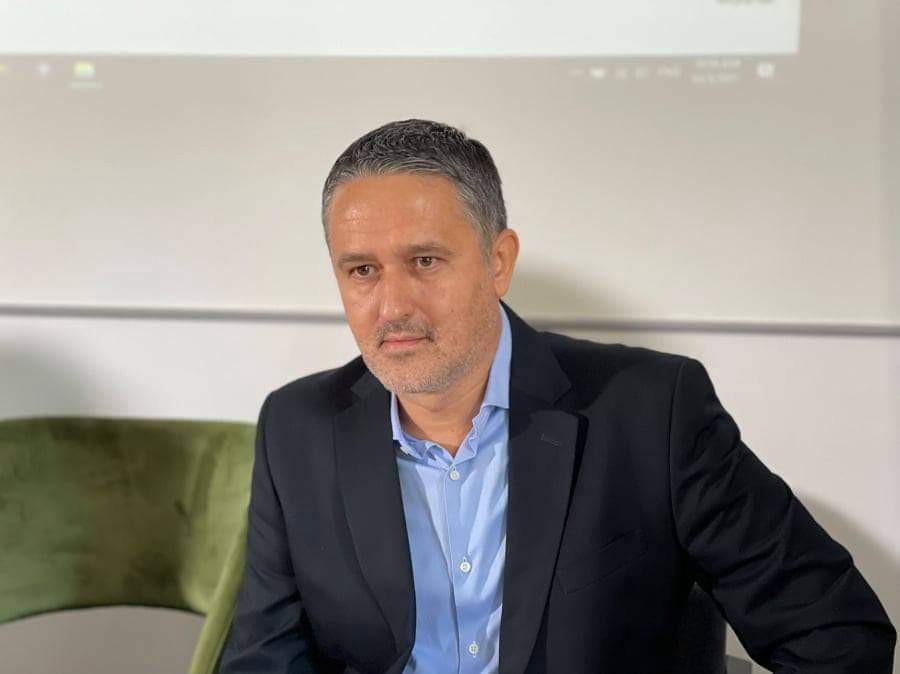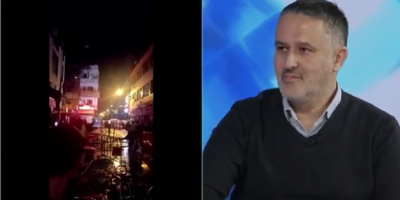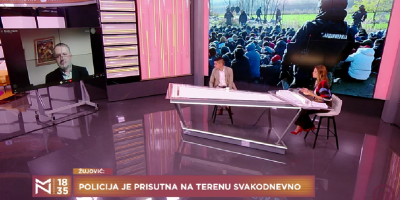Branko Zujovic: Serbian humor is a category that Europeans should get to know better


By Tijana Vučinović
Branko Žujović is a Serbian journalist and one of the members of the Association of Journalists of Serbia, the largest and the most significant association of professional journalists in Serbia, and a full-fledged member of the International Federation of Journalists (IFJ).
He lived in China for several years, where he worked for China International Radio, one of the world’s largest media outlets. He is currently the editor of the local Serbian portal Suboticke.rs and from time to time writes articles for the Serbian newspaper Pečat. He has written several books and won numerous awards, including the Best Report Award, which was presented to him in December this year.
What is your greatest fear?
Before I specifically answer this question, I must mention that I have worked over the years to rationalize and understand my fears. In 2010, American psychotherapist Ivan Kos, who came up with the so-called theory of fears, helped me a lot in that. In his book, which he gave me while his visit to Belgrade, he wrote me an unusual dedication: “To a very brave person”.
Reading this dedication, I remembered passing through the Posavina corridor during the war in Bosnia when I was only 17.
Our army had broken through that “corridor of life” a month before that. My uncle was killed in one of those battles. It was the only connection between the western Serbian parts of the former Yugoslavia and Serbia. I experienced shelling, which most likely came from Muslim positions. I remained completely calm. Fear overtook me later when we were already safe. Then I realized that I have certain patience in danger and that panic does not catch me so easily, which was shown during the NATO bombing of our country in 1999 when I was mobilized to defend my country.
I mention these experiences because, as a journalist, I am constantly exposed to the most primitive and mundane threats. This year, for example, a person who threatened me was sentenced to prison. Last week, a person very close to the security structures of my country called me on the phone, warning me, after all, quite friendly, that these days I should not drive my car because something bad could happen to me.
If you understand your fears, the only thing left for you, as one important Serbian writer would say, is to be afraid of one day not being afraid.
My only unbridled fear is that someone might try to take revenge on my family, because of my job, which is a mission and therefore leaves no room for compromise.
Which living person do you most admire?
I admire my wife Branislava very much because she proved that she would go to the end of the world because of our family and me. When I received an offer from the Chinese government to go to Beijing and work for several years at China International Radio, which is the largest media outlet in the world, my wife left her job in the library, which she dreamed of, and came with me to China. In ten years of marriage, I have never noticed that she lied to me, and with her love, wide education, beauty, and nobility, she brought the missing harmony into my life.
What do you most value in your friends/colleagues?
Courage, because after all, they remained my friends standing by my side in difficult times.
Who are your heroes in real life?
I already mentioned one. That’s my wife. I think I have largely answered this question by describing my relationship with her.
Then, my friends, that did not give up on me even when a really disgusting and ultimately dangerous chase was waged against me, solely because of the texts I published about corruption and crime.
In the third round are specific friends with whom I communicate unilaterally. There are disproportionately more of those friends than those who are really around me. I will mention only a few: Miloš Crnjanski, Momo Kapor, Erich Maria Remarque, Marcus Aurelius, Fodor M. Dostoevsky, Plato …
There is one exception here. His name is Slobodan Vladušić. He is my childhood friend and a very dear writer. I can boast that my friendship with him is twofold. I like the novels he wrote. Sometimes it is a pity that other Europeans do not know enough about Serbian literature, which is objectively great literature. But that is the fate of small nations.
What is the trait you most deplore in yourself?
I try not to judge people, but I do not always succeed. My final answer would be — shameless political inconsistency due to targeted selfishness at the expense of all of us. That is the most noticeable bad trait among our people in Serbia in this era, but also in the countries of the former Yugoslavia. People enter politics without a professional identity and knowledge, only to satisfy basic existential impulses and needs with jobs in the public sector, trampling on ethics and compatriots as a doormat.
On what occasion do you lie?
One study has shown that each person on average lies six times a day. Another study says that parents lie to a child by the age of ten more than three thousand times. So, I lie every day, that is axiomatic. I would be lying if I said that I tell the truth all the time. If I were to say that I never lied, I would deserve a serious psychiatric examination. I cannot typically isolate the circumstances in which I bypass the truth, because a lie sometimes comes from the deepest depths of our elusive subconscious. However, I believe that I use lies in social relations in the same way that the procedure of shortening fractions is used in mathematics. I equally believe that I do my best not to reach for untruths.
If you could change one thing about yourself, what would it be?
At first, I wanted to mention teeth as an answer, but I will replace them next year or a year later. That simply would not be the right answer. I am very comfortable in my personality and I would not change anything special there, not even my first wife. I used this traumatic experience of my first marriage in the best possible way. That lesson is one of the most precious in my life. When I could go back in time, I would spend more time enjoying some classical language, such as ancient Greek or Latin, and above that with ancient literature whose fruits I am reaping now, at 47, thus consolidating my foundations.
How would you like to die?
Someone said that a citizen is a pig who wants to die a natural death. I think, rightly and again quite immodestly, that I do not fall into that petty-bourgeois category. I don’t care how will I die because I gave my best in my humble life and thus maintained the flame of my freedom. Despite everything around me, I am a free person. No one but me has my time and actions at my disposal. I would only like my death not to be a long agony and not to be exactly as it was with Stendhal. One Serbian writer said that we have been learning how to die all our lives, and on one tank in the last Yugoslav war he wrote: Death does not hurt.
From the beginning, I understood my job as a journalist as a mission, not a mere profession. In the city where I have spent most of my life, I am defending the dignity of my vocation. I am a little lonely in that, but that is probably good for me. I researched most of my family’s past, I know who my ancestors were until the first half of the 17th century. I published some books, I traveled a bit.
A worthy journalistic work, a happy family, a little knowledge, and travel are my only achievements.
What is your motto?
If you intend to win, you must not lose. This is the motto from the “Alan Ford” comic, which was popular only in the former Yugoslavia and Italy. Members of my generation rely heavily on jokes from “Alan Ford” that are unusual. Serbian humor is also a category that Europeans should get to know better.
What is your present state of mind?
My mature years brought me the knowledge that democracy in the classical sense does not exist, that it is a stunning utopia, and that all the time we are just deciding on different types and levels of totalitarianism. The West, with more sense of finesse, very perfidiously, when it needs to be witty and harmonious, does essentially the same thing that the East accuses, which is often an elephant in the glass shop, although much less in recent years. Living in China for five years, I realized that there, as Napoleon feared, a great empire was resurrected that has little to do with the Cold War narrative rasters in the Western media. The bizarre fear of the West from Russia and China is a phenomenon that I am currently trying to decipher and understand to the end.
December 3oth 2021, https://tia-knight.medium.com/interview-485147077fcc


